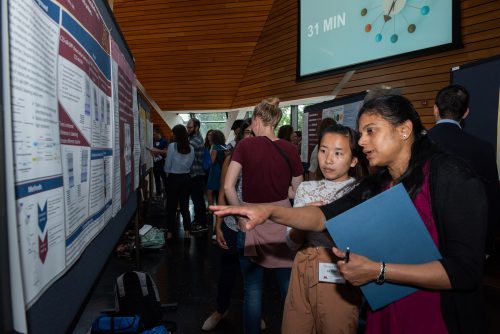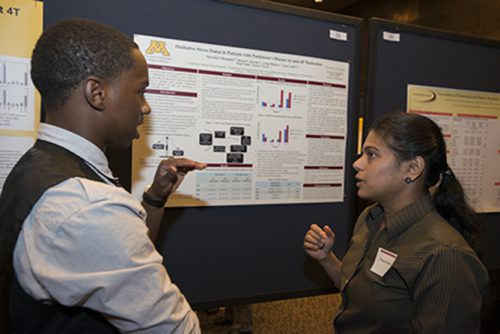Reena Kartha
Reena Kartha, Ph.D., came to the rare disease world through her work as a researcher. It is her passion for connecting the dots that led her to become a rare disease educator striving to introduce the next generation of healthcare students to rare diseases.
After earning a Master of Science degree in Biotechnology from the Tamil Nadu Agricultural University and a Doctor of Philosophy (Ph.D.) in Life Sciences with a focus on molecular and cellular biology and molecular genetics from the Indian Institute of Science, Dr. Kartha left India to continue her postdoctoral training at the Stanford University School of Medicine. While at Stanford, she began studying Merkel Cell Carcinoma, a rare skin cancer. It was here that Dr. Kartha first realized how difficult it is to conduct research and make progress in rare conditions due to limited access and availability of clinical samples. She looked for ways to improvise laboratory methods for isolating good quality RNA from the available samples for gene expression analyses, which would improve the early diagnosis and understanding of rare diseases.
While Dr. Kartha studied a variety of rare diseases, using cell and animal models, what really sets her apart is the approach she took. She recognized it was critical to bridge the gap between basic and clinical researchers. When she moved from Stanford to the University of Minnesota as a post-doctoral research associate, she brought this bridge-building philosophy with her and focused on translational research. The pharmacology lab she initially joined was collaborating with the Center for Orphan Drug Research (CODR) on a project in Adrenoleukodystrophy (ALD). ALD is a rare genetic disease that damages the myelin sheath that insulates nerve cells in the brain. According to the Mayo Clinic, ALD patients are unable to break down very long-chain fatty acids (VLCFA’s), leading to a build-up of saturated VLCFA’s in the brain, nervous system and adrenal gland. In children, if left undiagnosed, ALD can cause progressive neurological damage and death within 5-10 years.
After three years, Reena transitioned to the University of Minnesota’s Department of Experimental and Clinical Pharmacology and continued her work on ALD at CODR. It was in this role she began exploring the role oxidative stress and inflammation plays in rare diseases. She felt this understanding could offer vital improvements in the management of these rare diseases, by targeting these pathological processes with specific medications. Also, adequate knowledge of drug pharmacology and its mechanisms of action can help optimize dosages to get maximum benefit from a therapy.
Throughout her career, Reena recognized the importance of relationship-building. One way she does this is through her position on the Board of Directors of IndoUSRare. It allows her to contribute to this nonprofit organization’s mission of maximizing diversity in rare disease clinical trials and accelerating access to life-saving therapies globally. Another way she maximizes relationship-building is through connecting not only clinical researchers and translational scientists, but also making sure patient organizations had a place at the table. She pursued further training in clinical research. In 2016, she was accepted to the Rare Disease Scholar program and also as the Lysosomal Disease Network (LDN) Clinical Fellow, both National Institutes of Health (NIH) funded initiatives. This allowed her to continue expanding her network and making connections with physicians, researchers, and patient organizations both across the United States and throughout the world.
In 2017, Dr. Kartha was appointed as the Associate Director of Translational Pharmacology in the Center for Orphan Drug Research (CODR). As an LDN fellow, she initiated new projects on Gaucher disease (a lysosomal storage disease), expanding her research on inherited metabolic disorders. Her research focused on developing new therapies as well as identifying novel biomarkers that can track disease progression and treatment response. She continued to advocate for connecting basic and clinical researchers with rare disease patient advocacy organizations. She recognized the power of having post-doctoral fellows and other researchers get out of the lab and learn how the rare diseases they were studying actually impacted the everyday life of patients living with a particular rare disease.
As a rare disease scholar, interacting with others in the program, Dr. Kartha realized there was a lack of early and adequate engagement of next generation healthcare professionals. She observed current programs aim to educate medical students by integrating rare disease modules into the existing curriculum. However, Dr. Kartha believed if we start earlier than in medical school, we can cast a wider net of future professionals, influencing students as they embark on a healthcare career path. This led to her involvement in the University of Minnesota’s Grand Challenge Curriculum, which identifies a current challenge the community is facing and offers enrolled students a very hands-on approach to learning more about the challenge and working to develop real-world solutions. In addressing rare disease as a public health challenge, Dr. Kartha expanded her inclusive approach even further as she developed and began teaching a new course titled “Rare Diseases: What it Takes to Be a Medical Orphan”. In addition to her work on this course, Dr. Kartha also offers pharmacy students rotating in her lab the opportunity to interact with rare disease patients, to learn how they may rely on a pharmacist in their disease management, recognize existing limitations and improve pharmacy practice.

Reena designed “Rare Diseases: What it Takes to Be a Medical Orphan” to be very interactive, introducing students to the many facets of rare disease. Challenges of the diagnostic odyssey, barriers to research and clinical trials, legislative advocacy, pharmacy marketplace, financial concerns, patient organizations, and launching an awareness campaign are just some of the topics students will explore while in this course. The students also complete a final project, working with a patient advocacy organization, which allows them to learn from the real-world community while creating an impactful project.
Within the course, Reena again calls on the philosophy that sets her apart: bringing all stakeholders to the table. She has even introduced cross-disciplinary faculty from pharmacy, medicine, informatics, basic and clinical sciences. She sees the course as a way to get students interested in healthcare professions and to become more familiar with rare diseases, which will be vital as they move forward in their careers.
This honor level course open to all undergraduates at the University has attracted students from the colleges of design, liberal arts and biology. With a nod to the cross-disciplinary culture Reena is creating, a few students may even find innovative new ways to assist the rare disease community while completing their degrees in fine arts, creative writing and broadcast journalism.
As she says, she hopes the course will “put the sparkle in the students’ eyes”, instilling in them a passion for rare diseases. And for that, we think Dr. Reena Kartha is most definitely a Rare Disease Difference Maker®.
Who’s made a difference in your rare disease? Whether it’s a teacher, parent, pastor, friend, or physician, if you want to recognize someone who has impacted your life, click here to nominate them! Not only do we hope to recognize those who have made a difference in the rare disease community, but we also want to inspire others with practical and applicable ideas of how they can make a real, lasting impact in the community.

